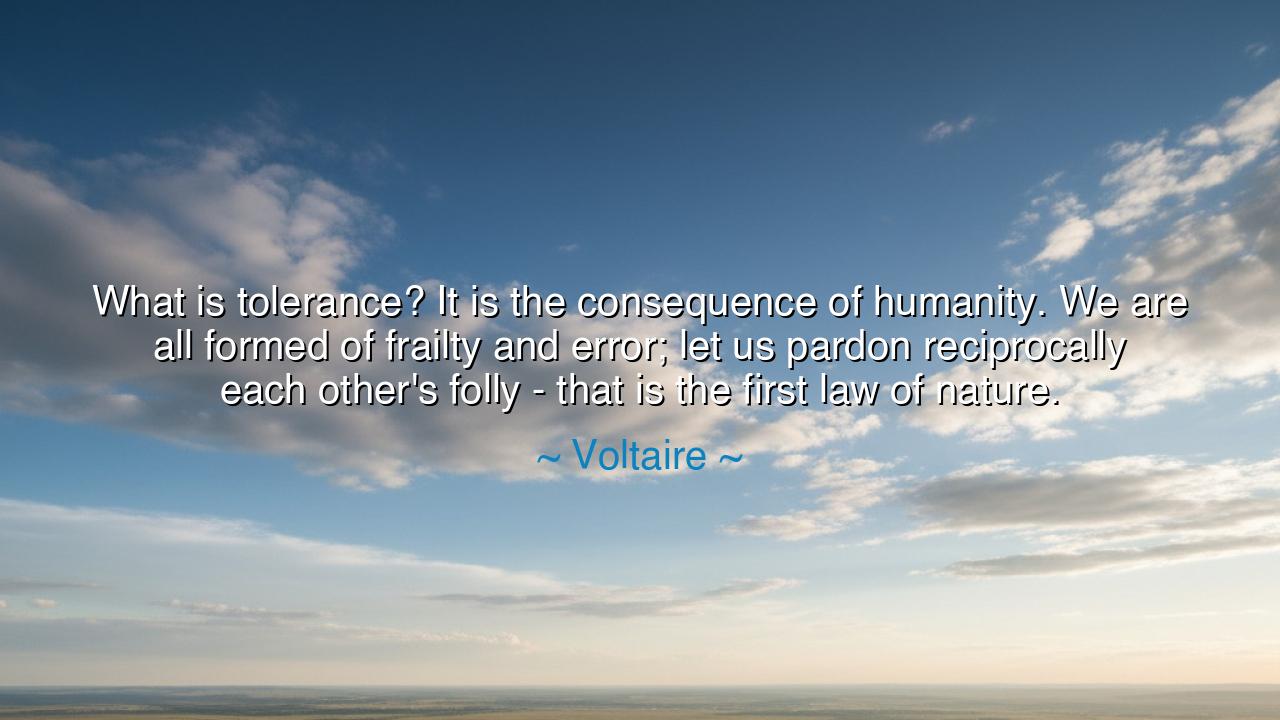
What is tolerance? It is the consequence of humanity. We are all
What is tolerance? It is the consequence of humanity. We are all formed of frailty and error; let us pardon reciprocally each other's folly - that is the first law of nature.






Voltaire, voice of the Enlightenment and scourge of fanaticism, declared with clarity that pierces across centuries: “What is tolerance? It is the consequence of humanity. We are all formed of frailty and error; let us pardon reciprocally each other's folly—that is the first law of nature.” In these words, he binds together two eternal truths: that men and women are creatures of frailty and error, and that to live together in peace requires tolerance, the mutual forgiveness of one another’s weaknesses. This is not indulgence of wickedness, but recognition that imperfection is woven into the fabric of human existence.
The origin of this saying flows from the turbulent world in which Voltaire lived. Eighteenth-century Europe was scarred by religious wars, persecution, and the rigid dogmas of church and state. Voltaire, having himself suffered imprisonment and exile for his words, understood deeply the dangers of intolerance. His call for tolerance was not a dream detached from life, but a survival code for humanity. In declaring it “the first law of nature,” he placed forgiveness and understanding alongside the primal instincts of survival itself.
History offers examples both tragic and triumphant. In France, the St. Bartholomew’s Day Massacre saw thousands of Protestants slaughtered in the name of religion. Here intolerance birthed rivers of blood, showing the folly of forgetting humanity. Yet centuries later, after the Second World War, nations ravaged by hatred chose instead to build the European Union, an act of tolerance forged from the ashes of devastation. Where once vengeance might have ruled, leaders chose to pardon and to cooperate, embodying the very law Voltaire described.
The emotional power of his words lies in their humility. Voltaire does not claim that humans are noble without flaw. Instead, he begins with frailty and error—our pride, our folly, our blindness. But from this foundation he builds hope: if all are guilty of folly, then all must learn to forgive. True tolerance is not condescension, nor weakness, but the strong recognition that one’s own errors demand mercy as much as another’s.
There is also a heroic call in this teaching. For tolerance is not passive acceptance, but an act of discipline and courage. To pardon another’s folly requires strength; to resist vengeance requires wisdom. The warrior who spares the defeated, the leader who forgives the insult, the friend who endures misunderstanding—these are practitioners of the first law of nature. They conquer not with the sword but with the higher victory of restraint.
The lesson is clear: cultivate tolerance as you would cultivate breath itself. In family, in friendship, in nations, there will always be folly, always error. If you demand perfection, you will sow only bitterness; but if you forgive, you create the soil in which peace and progress grow. This does not mean permitting injustice, but it does mean tempering justice with mercy, and tempering judgment with compassion.
Practically, this means to pause before condemning, to ask first: “Am I too not guilty of folly? Am I too not frail?” It means to choose dialogue over insult, reconciliation over estrangement. In daily life, it means granting space for mistakes, offering pardon where others fail, and seeking pardon for your own failures. For tolerance is not merely a virtue to admire—it is the very rhythm that allows humanity to endure.
Thus, Voltaire’s teaching resounds as eternal law: we are frail, we are erring, therefore we must forgive. To forget this is to walk the path of destruction. To remember it is to live in harmony with nature’s first command. Carry this wisdom, O listener, and let tolerance be your shield and your guide, for it is the true consequence of being human.






AAdministratorAdministrator
Welcome, honored guests. Please leave a comment, we will respond soon